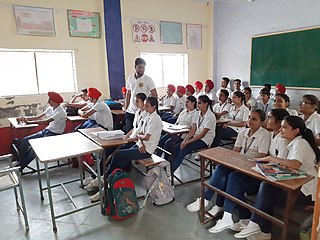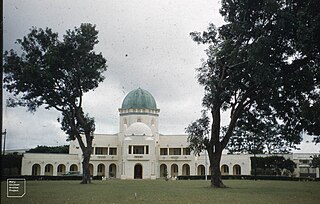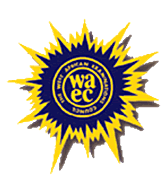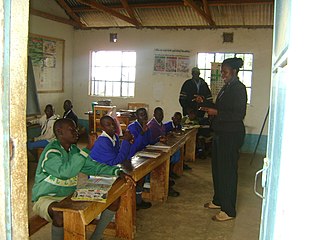Related Research Articles

Education is a purposeful activity directed at achieving certain aims, such as transmitting knowledge or fostering skills and character traits. These aims may include the development of understanding, rationality, kindness, and honesty. Various researchers emphasize the role of critical thinking in order to distinguish education from indoctrination. Some theorists require that education results in an improvement of the student while others prefer a value-neutral definition of the term. In a slightly different sense, education may also refer, not to the process, but to the product of this process: the mental states and dispositions possessed by educated people. Education originated as the transmission of cultural heritage from one generation to the next. Today, educational goals increasingly encompass new ideas such as the liberation of learners, skills needed for modern society, empathy, and complex vocational skills.

Vocational education is education that prepares people to work as a technician or to take up employment in a skilled craft or trade as a tradesperson or artisan. Vocational Education can also be seen as that type of education given to an individual to prepare that individual to be gainfully employed or self employed with requisite skill. Vocational education is known by a variety of names, depending on the country concerned, including career and technical education, or acronyms such as TVET and TAFE.
A Bachelor of Education (B.Ed.) is an undergraduate professional degree which prepares students for work as a teacher in schools. In some countries such as Tanzania and Kenya, additional tasks like field work and research are required in order for the student to be fully qualified to teach. It may also be accompanied with or followed by tests for licenses or certifications required for teachers in some areas.

Education in India is primarily managed by state-run public education system, which fall under the command of the government at three levels: central, state and local. Under various articles of the Indian Constitution and the Right of Children to Free and Compulsory Education Act, 2009, free and compulsory education is provided as a fundamental right to children aged 6 to 14. The approximate ratio of public schools to private schools in India is 7:5.

In education, a curriculum is broadly defined as the totality of student experiences that occur in the educational process. The term often refers specifically to a planned sequence of instruction, or to a view of the student's experiences in terms of the educator's or school's instructional goals. A curriculum may incorporate the planned interaction of pupils with instructional content, materials, resources, and processes for evaluating the attainment of educational objectives. Curricula are split into several categories: the explicit, the implicit, the excluded, and the extracurricular.
Education policy consists of the principles and policy decisions that influence the field of education, as well as the collection of laws and rules that govern the operation of education systems.

Cameroon is a Central African nation on the Gulf of Guinea. Bantu speakers were among the first groups to settle Cameroon, followed by the Muslim Fulani until German domination in 1884. After World War I, the French took over 80% of the area, and the British 20%. After World War II, self-government was granted, and in 1972, a unitary republic was formed out of East and West Cameroon. Until 1976 there were two separate education systems, French and English, which did not merge seamlessly. French is now considered the primary language of instruction. Local languages are generally not taught as there are too many, and choosing between them would raise further issues.

Kaduna is the capital city of Kaduna State, and the former political capital of Northern Nigeria. It is located in north-western Nigeria, on the Kaduna River. It is a trade Centre and a major transportation hub as the gateway to northern Nigeria, with its rail and important road network.

Open educational resources (OER) are teaching, learning, and research materials intentionally created and licensed to be free for the end user to own, share, and in most cases, modify. The term "OER" describes publicly accessible materials and resources for any user to use, re-mix, improve, and redistribute under some licenses. These are designed to reduce accessibility barriers by implementing best practices in teaching and to be adapted for local unique contexts.

Education in Bangladesh is overseen by the country's Ministry of Education. The Ministry of Primary and Mass Education is responsible for implementing policy for primary education and state-funded schools at a local level. In Bangladesh, all citizens must undertake ten years of compulsory education which consists of five years at primary school level and five years at high school level. Primary and secondary education is financed by the state and free of charge in public schools.

The Ontario Institute for Studies in Education of the University of Toronto (OISE/UT) is Canada's only all-graduate institute of teaching, learning and research, located in Toronto, Ontario. It is located directly above the St. George subway station, with the OISE Jackman Institute of Child Study located on Walmer Street by the Spadina station.
The National Institute of Education (NIE) is an autonomous institute of Nanyang Technological University (NTU) in Singapore. Ranked 12th in the world and 2nd in Asia by the QS World University Rankings in the subject of Education in 2015, the institute is the sole teacher education institute for teachers in Singapore.

The National Council of Educational Research and Training (NCERT) is an autonomous organisation of the Government of India which was established in 1961 as a literary, scientific and charitable Society under the Societies Registration Act. Its headquarters are located at Sri Aurbindo Marg in New Delhi. Roshan is Director of the council since 2022.

The West African Examinations Council (WAEC) is an examination board established by law to determine the examinations required in the public interest in the English-speaking West African countries, to conduct the examinations and to award certificates comparable to those of equivalent examining authorities internationally. Established in 1952, the council has contributed to education in Anglophone countries of West Africa, with the number of examinations they have coordinated, and certificates they have issued. They also formed an endowment fund, to contribute to the education in West Africa, through lectures, and aid to those who cannot afford education. Since established it continues to be one of the biggest and most globally recognized exams in West Africa.

Education in Nigeria is overseen by the Federal Ministry of Education. The local authorities take responsibility for implementing state-controlled policy regarding public education and state schools. The education system is divided into Kindergarten, Primary education, Secondary education, and Tertiary education. Nigeria's federal government has been dominated by instability since declaring independence from Britain, and as a result, a unified set of education policies is yet to be successfully implemented. Regional differences in quality, curriculum, and funding characterize the education system in Nigeria. Currently, Nigeria possesses the largest population of out-of-school learning youths in the world. The education system in the Southern Nigeria is different from the North. Most northerners have memorised the Holy Qur'an and use that as their education. The educational systems in Nigeria are divided into two the public where the student only pays for PTA while the private where students pay school fees and some other fees like sports, exam fees, computer fees etc. and they are costly
Froebel College is one of the four constituent colleges of the University of Roehampton.

The Federal Ministry of Education is a part of the Federal Ministries of Nigeria that directs education in Nigeria. It is located at Block 5A, Federal Secretariat Complex, Shehu Shagari Way, Central Area, P.M.B. 146, Garki, Abuja.
Bihar has been a major centre of learning and home to one of the oldest universities of India dating back to the fifth century and the tradition of learning which had its origin from ancient times was lost during the medieval period when it is believed that marauding armies of the invaders destroyed these centres of learning.
Education value is the process by which people give moral values to each other. According to Powney et al. It can be an activity that can take place in any human organisation. during which people are assisted by others, who may be older, in a condition experienced to make explicit our ethics in order to assess the effectiveness of these values and associated behaviour for their own and others' long term well-being, and to reflect on and acquire other values and behaviour which they recognise as being more effective for long term well-being of self and others. There is a difference between literacy and education.

Deaf education is the education of students with any degree of hearing loss or deafness. This may involve, but does not always, individually-planned, systematically-monitored teaching methods, adaptive materials, accessible settings, and other interventions designed to help students achieve a higher level of self-sufficiency and success in the school and community than they would achieve with a typical classroom education. There are different language modalities used in educational setting where students get varied communication methods. A number of countries focus on training teachers to teach deaf students with a variety of approaches and have organizations to aid deaf students.
References
- ↑ "National Teachers Institute (NTI), Kaduna – Britain-Nigeria Educational Trust".
- ↑ Eraikhuemen, Lucy; Oteze, I. K (2015). "AN EVALUATION OF THE NATIONAL TEACHERS' INSTITUTE NIGERIA CERTIFICATE IN EDUCATION". International Journal of Current Research. 7 (2): 13039–13043.
- ↑ National Teacher’s Institute, (N. T. I.) (1983), History of Nigerian Education Module 5. Ibadan; Evans Brothers (Nigerian Publishers) Ltd.